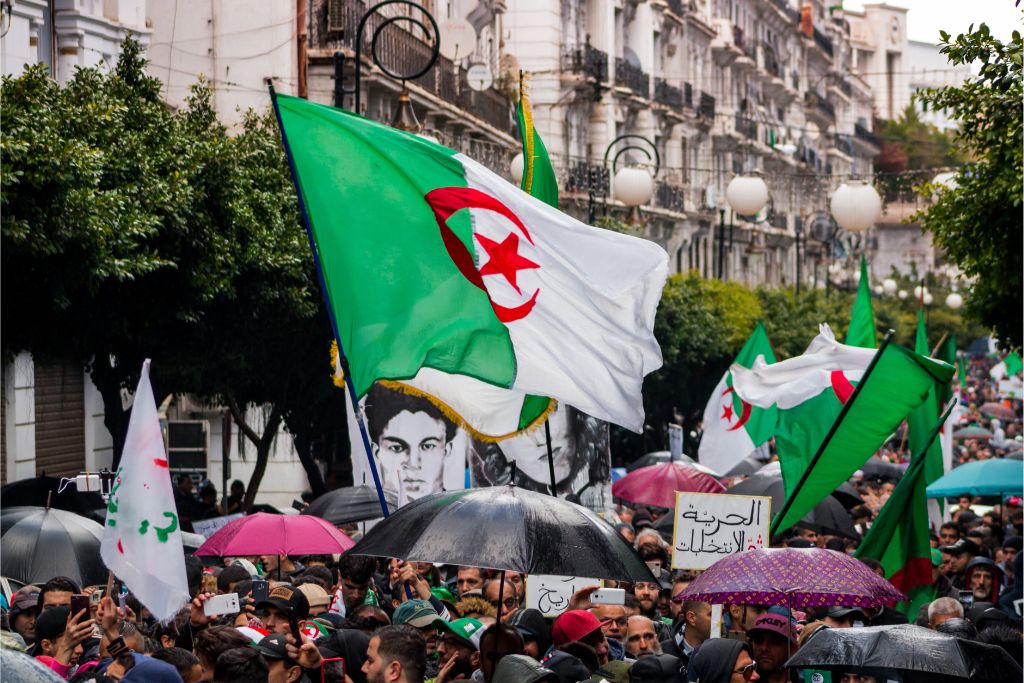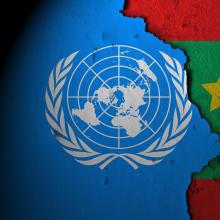March 28, 2023
On November 11, 2022, Algeria’s human rights record was reviewed during its fourth Universal Periodic Review (UPR) before the UN Human Rights Council (HRC). During the HRC’s 52nd session in March 2023, the Algerian delegation reported that it had accepted 215 of the 290 recommendations it was presented with (of which the delegation considers 55 to be implemented already), partially accepted 4, and took note of 70.
We, the undersigned organisations, are concerned that the Algerian government refrained from accepting recommendations geared towards strengthening the rights to freedom of expression, peaceful assembly, and association. Many recommendations that were not accepted by Algeria addressed the issue of arbitrary detentions, which are often carried out under the guise of counter-terrorism.
Freedom of expression
While Algeria accepted recommendations pertaining to the need to bring human rights legislation in line with the Constitution and the State’s relevant international obligations, the authorities claimed that the exercise of freedom of expression, assembly and association is already protected in the Constitution.
Yet, Algeria did not accept to amend Penal Code provisions that restrict freedom of expression and contradict article 19 of the International Covenant on Civil and Political Rights (ICCPR).
Although the 2012 Information Code decriminalised press offences, the Penal Code still contains prison sentences for acts that fall within freedom of expression. For example, accusations of “offending,” “insulting” or “defaming” public officials and institutions continue to be used to prosecute peaceful critics, with the delegation clarifying that they had no intention to decriminalise defamation. Another example of the criminalisation of freedom of expression is Algeria’s use of vaguely worded and overly broad provisions against peaceful critics, such as “harming national unity” and “harming national interest”.
Freedom of peaceful assembly and of association
Several states urged Algeria to amend its legislation on public meetings and demonstrations to ensure the right to freedom of peaceful assembly and of association.
While Algeria claims that this recommendation has already been implemented, we recall that the authorities have consistently relied on accusations of “unarmed gatherings” to arrest and detain peaceful demonstrators. The Law on Public Meetings and Gatherings, currently in force, contains a number of extremely restrictive provisions and still provides an authorisation regime that violates both the Constitution and international standards.
With regard to freedom of association, Algeria clarified that the “Constitution guarantees the right to establish associations by simple declaration” adding that “the conditions and modalities for establishing associations will be determined by the future Law on Associations.”
While the draft law mentioned by the Algerian delegation aims to create a declaratory regime for the creation of associations, the text contains a number of undue restrictions, formulated in overly vague terms such as the “respect for national constants and principles”.
In practice, civic space in Algeria has shrunk considerably in recent years. In early 2023, the Council of State dissolved the Rassemblement Action Jeunesse (RAJ). The same year, SOS Beb El Oued was shut down by the authorities after 21 years of activity, and its president Nacer Meghnine was imprisoned for his activism.
In the period that preceded the 2022 UPR, the Algerian authorities suspended and dissolved numerous political parties and civil society organisations, including the Algerian League for the Defense of Human Rights (LADDH). The decision can no longer be contested in court as its members learned of the decision months later, through social media in January 2023.
Arbitrary detention
Regarding the recommendations towards examining the treatment of people in detention, the practice of arbitrary arrests, and widespread impunity, Algeria maintained that “no one may be arrested unless there is evidence of his or her involvement in a crime or misdemeanor punishable by a custodial sentence.” The delegation also claimed that the rights of persons in police custody are guaranteed by law.
As of September 2021, approximately 1000 individuals had been prosecuted for participating in the ‘Hirak movement’ or for posting social media messages critical of the government. At least 32 people were then detained for the legitimate exercise of their human rights, and some of them faced lengthy sentences while others were still in pretrial detention. Several journalists are currently detained, including Ihsane El Kadi and Mustapha Bendjama, to name a few.
Torture
We welcome the fact that the Algerian delegation supported recommendations for the prevention of torture. For instance, Algeria accepted the recommendation regarding the effective implementation of the Convention against Torture (UNCAT), including training programs for law enforcement officials and for the judiciary. More importantly, Algeria agreed to reconcile the definition of the crime of torture in the national legislative framework with the definition given in the UNCAT.
Since the beginning of the protest movement in 2019, several cases of torture have been reported including those of activist Sami Dernouni and protestor Walid Nekiche. In 2021, a minor also claimed to have been sexually abused in a police station in Algiers prompting a debate on the treatment of people in detention. Those who reported the allegations made by the minor were arrested as a result. When allegations of torture and ill-treatment are raised in court, they are usually ignored.
Counterterrorism and human rights
In June 2021, the Algerian Penal Code was amended by broadening the definition of terrorism and establishing a national list of terrorist persons and entities, in a context where terrorism charges are increasingly used to prosecute peaceful dissidents and human rights defenders.
In that regard, the United States recommended that Algeria repeals its overly broad and vague definition of terrorism as formulated in article 87bis of the Penal Code. Similarly, Spain and Mexico urged the Algerian government to reconcile article 87bis with international human rights standards. Algeria responded stating that it had already implemented these recommendations, stating that Article 87bis of the Penal Code was in line with several UN Security Council resolutions.
We are extremely concerned that this recommendation was merely noted by the delegation while a similar recommendation was accepted during the previous UPR cycle of Algeria. We firmly believe that the authorities must stop using terrorism charges to suppress peaceful dissent.
Judiciary independence
Algeria’s judiciary system continues to suffer from interference by the executive. In 2018, the UN Human Rights Committee expressed concern over the fact that “the executive plays a significant role in the organisation of the judicial branch”. Though the Algerian delegation accepted several recommendations to strengthen the independence of the judiciary, Algeria maintained it had already implemented measures to ensure such independence. They cited the constitutional independence of the judiciary as well as the revision of the Law on the Superior Council of the Judiciary as examples.
It is worth recalling that independent judges have been subjected to disciplinary proceedings and several lawyers were prosecuted for defending their clients or exercising their right to freedom of expression.
Conclusion and demands
In light of the above, we, the undersigned organisations, call on the Algerian authorities to implement the recommendations they received during their last UPR, especially those pertaining to freedom of expression, assembly and association, the prohibition of torture, counterterrorism, and judiciary independence. Furthermore, we urge Algeria to reconsider its stance on the recommendations that were simply noted.
List of signatories*:
Cairo Institute For Human Rights Studies
EuroMed Rights
MENA Rights Group
* While the Human Rights Council adopted the outcome of Algeria's Universal Periodic Review on March 27, 2023, the above signatories organised an online event to discuss the current human rights situation in Algeria. The recording of the webinar is available here.







